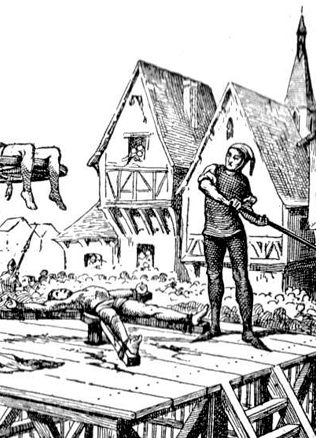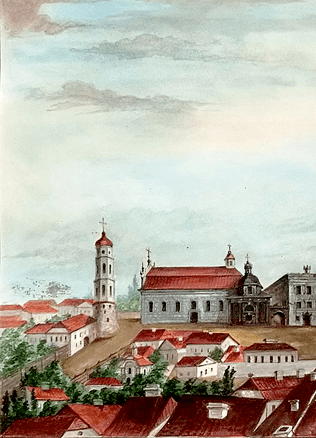Ways to earn money for poor nobleman
The nobility of Lithuania whose majority consisted of poor noblemen did not have many possibilities to become rich. But the position of the manager when serving in the estate of a richer nobleman could change the fate of an ordinary nobleman.
Work offering career perspectives
In historical sources the manager is usually called the deputy, later (in the 17th–18th centuries) – an administrator, a steward, a governor and the like. There were no official credentials for this position. Most often the noblemen (Radziwiłł, Sapieha, Chodkiewicz) appointed noblemen who they trusted to administer their estates. The future manager had to be honest, loyal and understand the peculiarities of management.
The manager saw to it that the life of the estate entrusted to him should be lived in an ordinary way.
He could have assistants, sometimes a clerk who most often recorded the income derived from the estate. The main duty of the manager was to collect taxes from the estate that he managed. He also resolved disagreements and followed his Ruler’s instructions.
From the end of the 16th century, the majority of the nobility started to issue instructions, regulations for the managers of their personal estates, which had to help the manages to manage and the nobility to get more profit from the estate. There were several ways of settling accounts with the manager: in kind (with the products collected from the peasants: corn, hens, eggs and the like), and by paying money, by giving an estate, land as a gift, by helping them to get some position. It was an excellent possibility for the poor nobility to become rich and, by helping their “employer”, to make a career.
Let us look at how the position of the manager changed the fates of the noblemen Jan Grużewski and Kaspar Szwejkowski.
Ordinary nobleman to a large landowner
Jan Grużewski (about 1540–1609) was from Poland, from a poor land of Mazovia. He made a career by administrating Nechnevich estate (Belarus) that belonged to Michal Radziwiłł the Black. Having managed that estate for as long as twenty years and enjoyed confidence of Radziwiłł the Orphan, in 1581, Jan Grużewski was entrusted with managing Šiauliai economy, the most profitable estate in Samogitia. Having become Manager of the economy, Jan Grużewski was faced not only with the ordinary duties of a manager but also with the peculiarities of management of a large estate. Every day large flows of documents reached him, which he had to handle and archive.
During the time of administering Šiauliai economy Jan Grużewski accumulated large income, acquired knowledge and practice of managing the estates.
All that helped him to acquire three large estates in Samogitia: Želviai (1586), Šilėnai (1587) and Kelmė (1591). In this way Jan Grużewski became a large landowner of Samogitia, and the estate that he “constructed” established firm foundations for the rise of the Grużewski family. Furthermore, the former manager of Šiauliai economy supervised the towns of Joniškis, Radviliškis, Šiauliai, Naujoji Žagarė, and soon adapted practice of their administration to the town of Kelmė, which he bought shortly after. At first, he commissioned land surveyors to measure the town, to put the holdings, streets in order; taxes imposed on the town dwellers were redistributed. The results of the changes were as follows: the amount of income increased from 200 to 250 score grosz. By managing the estates belonging to other people Jan Grużewski acquired his own estates and cleverly adapted experience gained to managing them, which increased his income even more.
The best investment is the noblemen’s trust
Do You Know?
The position of an estate manager provided the manager with the possibilities to win the nobleman’s trust, which brought profit over the full measure. For example, after that battle at the Ula River in 1564, Radziwill the Brown wrote to the Ruler Sigismund Augustus asking him to give the manager of Biržai Kaspar Szwejkowski 40 voloks of land to “subsist on” and noted that the latter fought valiantly with the Muscovites and killed the Hetman of Moscow Piotr Shuisk. Sigismund Augustus granted the request and gave 40 voloks to the manager though the killing of the Hetman of Moscow mentioned was only a clever deception of Radziwiłł the Red asking for land for his manager.
Kaspar Szwejkowski (died around 1571) most likely was a nobleman of Polish origin. At first, he served in the estate of Radziwiłł the Red. In 1561, Radziwiłł the Red entrusted him with administering the large former estate of Biržai in North Lithuania. Having received the estate Kaspar Szwejkowski issued the order to take an inventory of it, and in 1563 the Volok reform was carried out in the principality of Biržai. Administration of the said estate helped Kaspar Szwejkowski to establish relations with the local nobility of Upytė district. Soon he invested the income derived from the position of the manager – in 1564 he acquired estates in Vilnius district, in a small rural district of Giedraičiai. Besides, together with Radziwiłł the Red he participated in the battle of the troops of the Grand Duchy of Lithuania with the Dukedom of Moscow near the Ula River in 1564. Radziwiłł the Brown wrote to Sigismund Augustus asking him to give 40 voloks of land to the manager of Biržai to “subsist on” and noted that the latter fought valiantly with the Muscovites and killed the Hetman of Moscow Piotr Shuisk. Sigismund Augustus granted the request and gave 40 voloks to the manager though the killing of the Hetman of Moscow mentioned was only a clever deception of Radziwiłł the Red asking for land for his manager. Most probably Kaspar Szwejkowski earned great trust of his “employer” because even after the death of the manager the Radziwiłł’s supported his sons and helped them to become influential noblemen.
Hence, the position of a manager most often was given to a poor nobleman who administered the estate (holding) entrusted to him and tried to gain his “employer’s” – the nobleman’s trust. And that could determine not only larger income for the manager, ensure his career but also a further fate of his family members.
Jonas Drungilas



